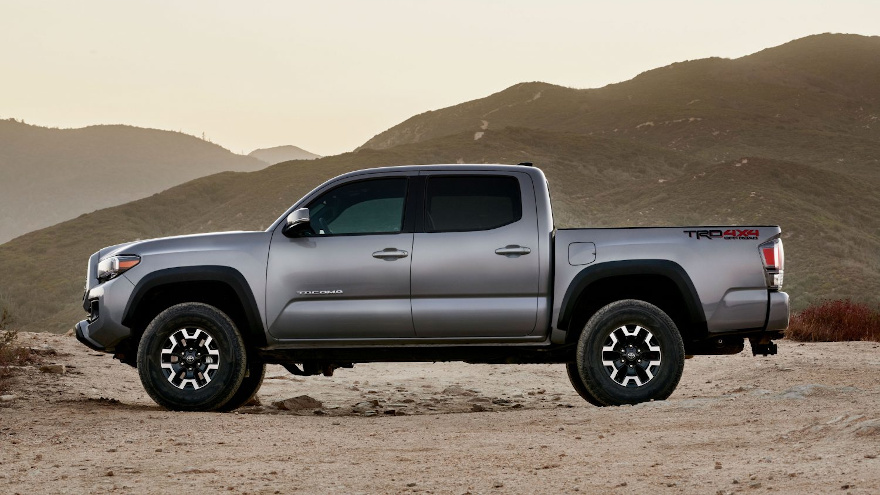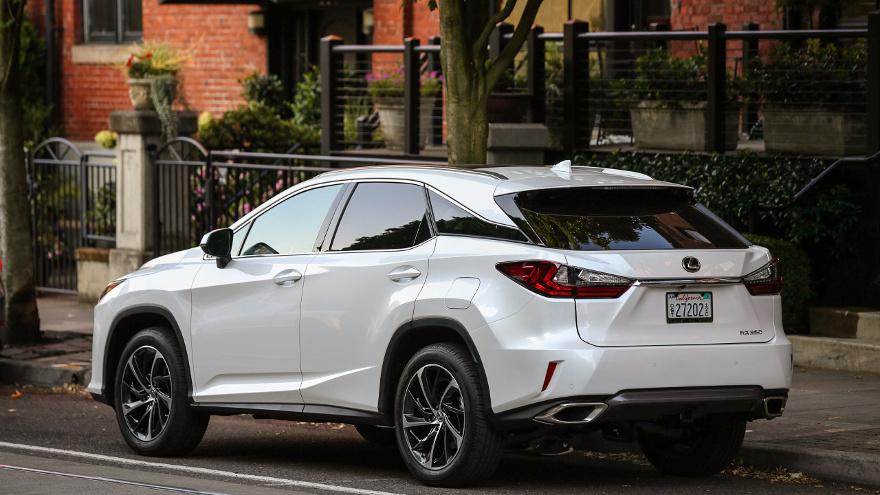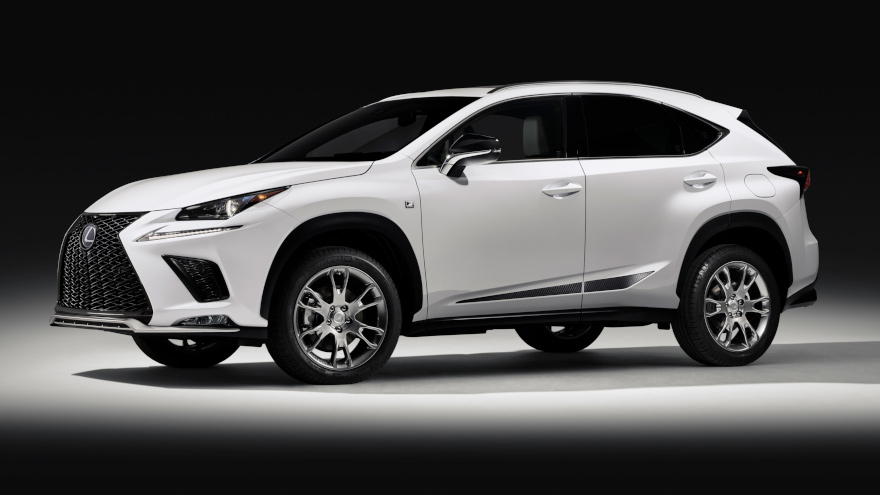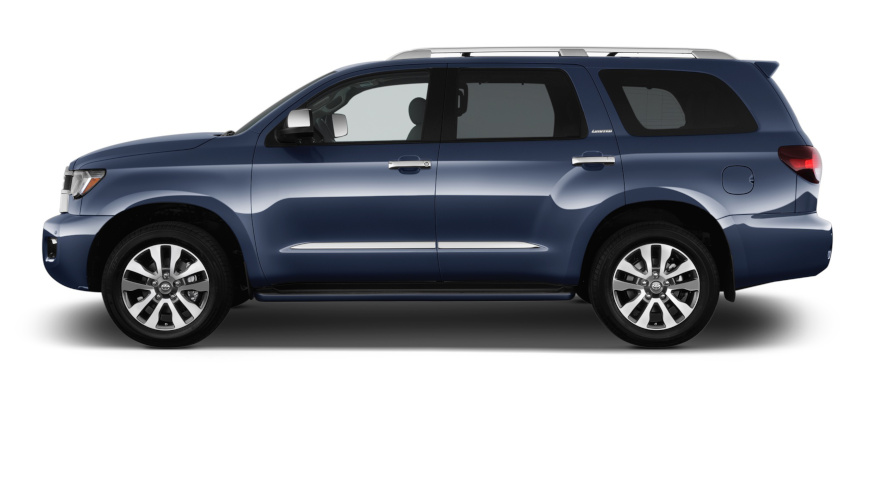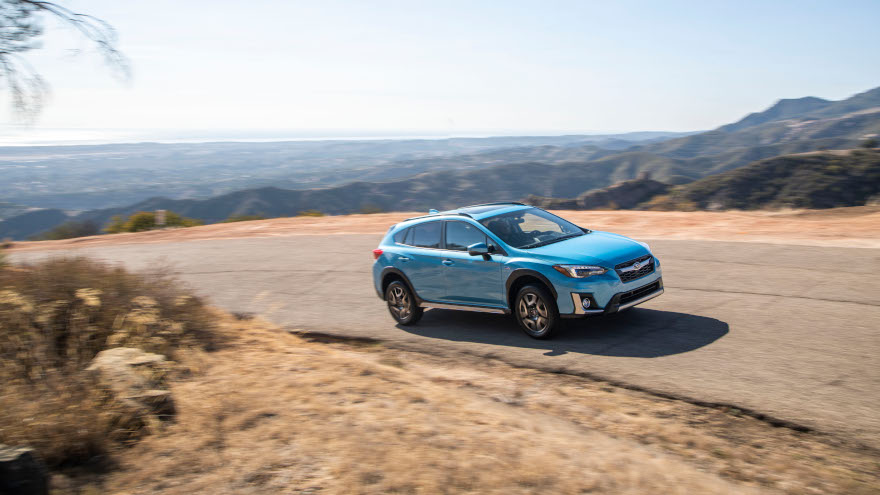Once again, the top 10 models in Kelley Blue Book’s Best Resale Value Award Winners list are dominated by trucks. One exception is what Kelley Blue Book director of residual values Eric Ibara describes as the “much-hyped” 2020 Chevrolet Corvette.
“Without the imminent prospect of significantly higher gas prices, the used-car demand for trucks continues to be an ongoing, multi-year trend, directly impacting new cars,” Ibara said in a news release.
Kelley Blue Book says “to help new-car buyers shop smart,” it is announcing its 2020 model-year brand, category and top 10 winners of the annual Best Resale Value Awards. The Best Resale Value: Brand winner is Subaru, and the Best Resale Value: Luxury Brand winner is Porsche.
The awards recognize vehicles for their projected retained value through the initial five-year ownership period.
Subaru wins the Best Resale Value: Brand category for the fourth time, with previous wins in 2011, 2015 and 2016. Porsche’s win as Best Resale Value: Luxury Brand is its fourth straight honor in the category.
Kelley Blue Book’s Best Resale Value Awards are now in their 18th year and are based on projections from the Kelley Blue Book Official Residual Value Guide.
The company says many new-car buyers do not realize that depreciation often is the greatest expense drivers incur during the first five years of vehicle ownership. After a five-year ownership period, wn average 2020 model-year vehicle will only retain about 37% of its original value. Kelley Blue Book explains that means a $35,000 new car today will only be worth somewhere close to $12,950 after five years.
Kelley Blue Book says that in comparison, all vehicles in its Top 10 for Best Resale Value are projected to retain more than 50% of their MSRP.
This year’s top model, the 2020 Toyota Tacoma, is expected to be worth 61% of its MSRP after five years.
Resale value for new vehicles can vary greatly, according to Kelley Blue Book. The company says vehicles with average or below-average resale values are usually plentiful in the marketplace and easy to find.
But certain vehicles are projected to hold their value better than others.
“While much of a vehicle’s resale value is based on supply and demand, as well as current and projected future market conditions, vehicles that retain their value best typically are discounted the least and tend to generate high levels of consumer interest,” Kelley Blue Book writes.
Following is a list of the winners:
— 2020 best resale value, brand: Subaru
— 2020 best resale value, luxury brand: Porsche
2020 best resale value: By vehicle category
— Compact car: Subaru Impreza
— Midsize car: Subaru Legacy
— Full-size car: Toyota Avalon
— Entry-level luxury car: Lexus ES
— Luxury car: Lexus GS
— High-end luxury car: Porsche Panamera
— Sports car: Chevrolet Corvette
— Hybrid car: Toyota Prius Prime
— Electric vehicle: Tesla Model X
— Subcompact SUV: Subaru Crosstrek
— Compact SUV: Subaru Forester
— Midsize SUV – 2-ROW: Subaru Outback
— Midsize SUV – 3-ROW: Toyota Highlander
— Full-size SUV: GMC Yukon
— Luxury subcompact SUV: Volvo XC40
— Luxury compact SUV: Porsche Macan
— Luxury midsize SUV – 2-row: Porsche Cayenne
— Luxury midsize SUV – 3-row: Lexus GX
— Luxury full-size SUV: Lexus LX
— Off-road SUV: Jeep Wrangler 4-Door
— Midsize pickup truck: Toyota Tacoma
— Full-size pickup truck: Toyota Tundra
— Full-size pickup truck – heavy duty: Chevrolet Silverado HD
— Minivan: Honda Odyssey
2020 best resale value: Top 10 cars (alphabetical order)
— Chevrolet Corvette
— Chevrolet Silverado
— Ford Ranger
— GMC Sierra
— Jeep Gladiator
— Jeep Wrangler
— Ram Pickup
— Toyota 4Runner
— Toyota Tacoma
— Toyota Tundra
J.D. Power says that when a vehicle retains a strong resale value, it also typically has higher residual values, and the company said in a news release that those vehicles “offer unmistakable benefits to automakers and consumers alike.”
In the 2019 J.D. Power Resale Value Awards, which were presented to automakers on Wednesday, the GMC Sierra 3500 was shown to have the best resale value in the industry.
Other brands also took the spotlight, with Lexus receiving the most model-level awards with six. Honda followed with five model-level awards, Toyota won four, and Porsche received three model-level awards.
The awards recognize the top resale value across 26 model-level segments following three years of ownership. Lexus won model-level awards for the CT, RC, GS, NX, RX, and LX. Honda’s model-level awards were for the Fit, Civic, Accord, CR-V and Odyssey.
Toyota won model-level awards for the Prius, Tacoma, 4Runner, and Tundra, while Porsche’s model-level awards were for the Cayman, 911 and Panamera.
The Audi Q3, Chevrolet Tahoe, Dodge Challenger, Dodge Charger, GMC Sierra 3500, Scion tC and Subaru Crosstrek were additional models that ranked highest in their respective segments.
J.D. Power vice president of vehicle valuations and analytics Jonathan Banks said in a news release that depreciation is one of new-vehicle owners’ biggest concerns.
“Our transaction database shows the models that have the lowest depreciation costs, which can be very helpful to new-car buyers when deciding on their purchase,” Banks said.
J.D. Power evaluated 256 vehicle models for the 2019 award process. For the evaluation, the company used a sample of more than 630,000 transactions and assessed an average of 2,400 transactions on each vehicle.
The company explained that it uses used-vehicle wholesale prices for its award selection process, and the prices show how much a dealer pays for a used vehicle. These prices are then divided by the vehicle’s original purchase price, and the company bases the calculations on wholesale records from January through June 2019 for three-year-old vehicles. The applicable model year is 2016 for the 2019 calculation.
Vehicles that retain a strong residual value offer an unmistakable benefit to automakers and consumers alike. Such models allow for a competitive cost of ownership and leasing advantage, with some being better values when it comes to leasing.
One of the biggest factors in the total cost of a lease is the vehicle's residual value. This is especially important on the luxury side of the market because leasing tends to be more popular in this sector than on the mass market side.
From a financial viewpoint, the best models to lease are those with a high residual value compared with their original MSRP. Typically, high residual values result in lower lease payments, as well. Consumers who prefer to purchase their vehicles rather than lease benefit, too. High residual values allow owners to accrue positive equity more quickly. This ultimately improves the consumers’ purchasing power when it's time to buy or lease their next vehicle.
This is why J.D. Power has dedicated research resources across both new and used markets. This, combined with our analytical capabilities, allows us to develop highly sophisticated valuation models to forecast residual values. Those efforts come to life through the debut of the J.D. Power Luxury Residual Value All-Stars.
Read about the leaders and key takeaways in the mass market vehicle segments here.
The methodology that drives the J.D. Power Residual Value All-Stars
One of our biggest strengths when it comes to evaluating residual values is the transparency behind how we forecast these figures. The diversity of J.D. Power customer survey data — such as our vehicle dependability study and wholesale and retail sales data — allows us to have a very comprehensive approach to identifying and measuring residual-defining characteristics.
We integrate all of this data to produce residual value figures. Every two months, residual values are created, and identify vehicles forecasted to have the highest residual value at 36 months. The brands and models highlighted possess characteristics attributed to strong residual value including quality, strong performance figures, fuel economy, standard and optional equipment, and attractive design language.
Here are the hottest segments and vehicles that have the strongest residual value outlook on the list of J.D. Power 2019 Luxury Residual Value All-Stars:
The hottest segments and models of the 2019 Luxury Residual Value All-Stars
When it comes to the luxury side of the industry, there are a few segments that are increasingly important with each passing year. SUVs are a key example of this as we have seen several segments in this category grow in popularity over the past few years. Consumers in both the luxury and mainstream marketplaces are drawn to SUVs because of their practicality and increasing levels of fuel efficiency.
Many models are using smaller displacement turbocharged or hybrid powertrains, which is helping to narrow the efficiency gap between SUVs and their car counterparts. As a result, more and more of these models are being built and sold each year.
For context, in 2018 roughly 70% of new vehicles sold were SUVs, trucks or vans, while only 30% were passenger cars. With more SUVs sold on the new side of the market, more are returning to the used side of the market as well. Typically, increased levels of supply returning to the market can suppress used vehicle values, however the outlook for SUVs remains healthy because of increasing levels of demand — for both new and used units.
2019 Lexus NX Compact Premium SUV Segment — 51% J.D. Power Residual Value Projection
One of the hottest segments right now is the compact premium SUV category. With each passing year, market share of this segment increases, along with the footprint and number of vehicles available in this segment. Overall, the compact premium SUV segment is expected to carry an average 36-month residual value of 46%. The Lexus NX is projected to be one of the top vehicles in this category.
As a result, the NX's 36-month residual value is expected to be 51% — or 5 percentage points better than the overall segment average.
The NX was introduced for the 2015 model year and it quickly earned a reputation for being the smart choice catering to buyers wanting sporty style, comfort and reliability. Its unique design is truly like nothing else in its class.
As far as powertrain, the NX is propelled by a powerful and efficient 2-liter turbo four-cylinder and offers an optional hybrid powertrain as well, helping take fuel economy to the next level. The NX hybrid can achieve up to a combined 31 miles per gallon. Very impressive for an SUV.
2019 Land Rover Discovery Mid-Sized Premium SUV Segment — 54% J.D. Power Residual Value Projection
While the 2019 Land Rover Discovery wound up leading the category, there was some stiff competition in residual values for the mid-sized premium SUV segment. Lexus ranked two of the top three models in the J.D. Power 2019 U.S. Vehicle Dependability Study and both vehicles ended up with high residual values; the Lexus GX received 53%, closely followed by the Lexus RX with 50%.
However, neither are expected to be the top performing model in this class. The 2019 Land Rover Discovery's 36-month residual value is expected to narrowly edge out the GX at 54%. The current Discovery is the fifth generation of the model and was introduced in its current form in 2017. Few SUVs are as skillful as the Discovery, both in terms of its off-road capabilities and its passenger hauling ability.
The latest generation has also earned a reputation for having smooth driving manners on-road and a luxury interior with excellent materials, which help it climb to the top of the class.
2019 Lexus LX Large Premium SUV Segment — 52% J.D. Power Residual Value Projection
Large premium SUVs remain popular choices for their ruggedness and people hauling capabilities. The 2019 Lexus LX is a prime example of this. While it’s no secret that the LX is based off the fan favorite Toyota Land Cruiser, Lexus has taken advantage of the Land Cruiser’s rock solid off-road ready platform, refined it and packed it full of enough premium content to transform it into the top contender in its class.
As the flagship SUV of Lexus, the LX does not have multiple trim levels. However, it does come well equipped with a significant list of standard features. The only choices that customers have are the seating arrangement, color and a few extra-luxurious add-ons. The formula is simple yet helps the Lexus earn its 52% residual value projection.
Luxury Car Segment Retention Solid as Well
While for the most part, car segments are not expected to perform as well as their SUV counterparts, residual value expectations are still strong.
2019 Lexus GS Midsize Premium Car – 50% J.D. Power Residual Value Projection
The 2019 Lexus GS has been around in its current configuration since the 2013 model year. However, the GS has aged gracefully and remains one of the top vehicles in its class with a 50% residual value projection.
The GS has an unmistakable appearance and has proven it can go toe to toe with the best competition from other luxury European and Asian brands. For 2019, the GS pares its powertrain menu down by one — the hybrid is gone. Instead, the 2019 GS is offered with a trio of engine possibilities: 4-, 6-, or 8-cylinder power. The GS 300 gets the turbo-4, the GS 350 gets a V6, and the GS F gets a high-performance V8.
2019 Lexus LS Large Premium Car – 44% Power Residual Value Projection
New for 2018, the LS set itself apart from the competition with bold styling inside and out. A new twin-turbo 3.4-liter V-6 makes 416 hp available in rear or all-wheel drive, plus there’s an available hybrid that uses a V-6 and two electric motors. Following the industry trend, a V8 is no longer offered. The LS is priced at a significant discount to an S-class; however, with a 44% residual value projection, it’s top of the class in terms of value retention.
2019 Porsche 911 Premium Sport – 60% Power Residual Value Projection
The 2019 Porsche 911 is special because it also ranked as the most dependable model in the J.D. Power 2019 U.S. Vehicle Dependability Study. True to its iconic heritage and cult-like following, the 911 offers several engine options and precision handling to put them to good use. The cabin has an abundance of premium, high-quality materials.
While the front seats are comfortable, the rear seats are cramped, and you can fold them down to create more cargo space. Make no mistake, the 911 is expensive but, with an estimated 60% residual value projection, owners will be in a good place down the road.
How Toyota and Lexus are Leading the Premium Market in Residual Value
Similar to mainstream segments, Toyota and its premium Lexus brand tend to rank at the top or near the top of their respective classes. This is due to their perceived reliability, quality and inherent value. Most recently, Lexus ranked highest in the J.D. Power 2019 U.S. Vehicle Dependability Study. This was the eighth consecutive year that Lexus has claimed that spot and they have now become a benchmark for the premium industry.
Conclusion
As vehicles continue to become more expensive each year, residual values are more important than ever when leasing or purchasing a new vehicle. Purchasers can use J.D. Power residual values as a guide for smart shopping and making more informed decisions when buying or leasing a new vehicle.
Likewise, automakers, finance companies and dealerships can also use these residual values to forecast their portfolios and make better business decisions as they match vehicle features, inventory and pricing to consumer demands and ultimately decreasing time-on-lot and increasing vehicle transactions.
David Paris is supervisor of market intelligence at J.D. Power. He discusses this second installment of the awards program and more in the podcast below.
Record-high numbers of vehicles are coming off lease in 2019. At the same time, prices and interest rates are edging higher.
With those trends in mind, understanding a vehicle’s retained value is extremely important for a shopper in knowing how much he or she can afford when buying a new vehicle, Edmunds senior consumer advice editor Matt Jones said in a news release.
To help those shoppers, Edmunds announced its 2019 Edmunds Best Retained Value Awards, recognizing the new 2019 vehicles and brands with the highest projected residual values after five years.
Toyota and Lexus won brand-level awards in the standard and luxury categories, respectively. That means they had the highest aggregate retained value scores in their class.
“Savvy shoppers know that vehicles on the Edmunds Best Retained Value list are likely to hold their value down the road, which is key to getting a reasonable lease payment or a good trade-in price,” Jones said.
Edmunds determines the 2019 Edmunds Best Retained Value Awards based on the qualifying new models with the highest projected private-party residual value five years after their launch, expressed as a percentage of their initial True Market Value.
Toyota and Subaru claimed three model-level wins apiece, while Honda won two.
The 2019 Sequoia (large SUV), the 2019 Tundra (large truck) and the 2019 Tacoma (midsize truck) were the winning Toyota vehicles.
The 2019 Impreza (compact car), the 2019 Crosstrek (compact SUV) and the 2019 WRX (sports car) were winners for Subaru. The winning Honda models are the 2019 Accord (midsize car) and 2019 Odyssey (minivan).
Other winners included the 2019 Dodge Charger (large car), the 2019 Jeep Wrangler (midsize SUV), and the 2019 Ford Transit Van (van).
Lexus led the pack among luxury automakers with three model-level awards: the 2019 NX 300 (luxury compact SUV), the 2019 ES 350 (luxury midsize car) and the 2019 GX 460 (luxury midsize SUV).
Additional luxury winners included the 2019 Mercedes-Benz CLA-Class (luxury compact car), the 2019 Audi A7 (luxury large car), the 2019 Land Rover Range Rover (luxury large SUV), and the 2019 Porsche 911 (luxury sports car).
To be considered for a model-level award, a vehicle must be a 2019 model year that launched on or before Dec. 31 with sales in January that are not less than 25 percent of the average aggregate sales in that month for all of the other models in its award segment.
For brand-level award eligibility, an automaker must have eligible vehicles competing in at least four of the 18 award segments.
Projecting residual values is a complicated process made even more intense with the depth of features and technology in new vehicles coupled with other market factors in play.
Describing how ALG handles those challenges, Nick connected with vice president strategic initiatives Alain Nana-Sinkam for a discussion during NADA Show 2019 about the future of residual-value forecasts.
The full discussion can be found below.
Download and subscribe to the Auto Remarketing Podcast on iTunes or on Google Play.
You can also listen to the latest episode in the window below.
Catch the latest episodes on the Auto Remarketing Podcast homepage and on our Soundcloud page.
Residual values for used cars rose by an average of 3 percent in 2018. The growth in value represents a remarkable turn of events from 2017 when there was significant pessimism about the state of the used-car market. The negative sentiment a year ago was driven by concerns that a glut of used vehicles coming back to the market would cause serious price erosion.
In fact, we saw the opposite take place in 2018 — especially for used compact and midsize cars, which saw prices surge by a whopping 8 percent — demonstrating that there is still strong consumer demand for affordable small and mid-sized cars despite OEM’s focus on bringing SUVs and CUVs to market.
Outlook for 2019
The J.D. Power analysis of the current residual values landscape indicates that used vehicles are filling several important gaps in the overall auto market across the United States.
That is why we are projecting the used market in 2019 to largely mirror what we observed last year, with a few big exceptions.
- We expect to see production cuts in the traditional passenger car segments, which will put upward pressure on prices for new cars in this category, which, in turn, will have an impact on used-vehicle valuations.
- On the other side of the equation, we are keeping an eye on the interest rate situation. Significant interest rate increases could reduce demand for used vehicles in 2019.
- Growth in used-vehicle supply is expected to continue, which will put downward pressure on residual values (a trend we are already starting to see as more used trucks and SUVs re-enter the market).
Overall, we believe the 2019 used-car market will provide a healthy environment for consumers.
In fact, we believe that the used market is going to play a huge role in the industry, as dealer groups place a stronger emphasis on leveraging this aspect of their operations to shore up bottom lines. Dealers, for instance, are making structural changes in the way they sell used cars by:
- Investing in online channels to expand their used car footprint;
- Placing greater emphasis on their certified pre-owned (CPO) offerings; and
- Improving their management of used-vehicle supply channels so that they can fully understand how demand for specific vehicles within their regions — and across the nation — are manifesting themselves.
Integrating data sources to better understand residual valuations
To help the industry manage these evolving dynamics in 2019, J.D. Power has a range of products and services that provide insight into used car residual values, as outlined below:
— We have built a database that identifies option content at the vehicle identification number (VIN) level. We are adding precision to help dealers optimize inventory management.
— We are partnering with a vehicle history company to identify the background of a specific VIN.
— We have developed tools that can access vehicle content data down to the model level to provide a granular insight into how actual supply will impact short- and long-term pricing trends.
The J.D. Power valuation team is integrating these and other features into a set of digital tools that can be accessed by our auto dealer and lender clients via our B2B website, and can be integrated into our clients’ internal analytical tools via newly designed application program interfaces (APIs). Our objective is to help clients make better decisions on inventory management and other key aspects of their business. To learn more about J.D. Power Valuation Services, visit: http://www.nada.com/b2b
Jonathan Banks is vice president and general manager, vehicle valuations at J.D. Power.
Auto Remarketing caught up with Jonathan at the recent NADA Show 2019 to talk about this column, his thoughts on why the used-car market is so healthy and much more. That discussion can be found in the podcast below.
When purchasing a vehicle, buyers would be wise to consider typical ownership costs to see the out-of-pocket expenses they will incur beyond the initial purchase price.
Kelley Blue Book took that into account in naming its 2019 5-Year Cost to Own Award winners, recognizing new vehicles with the lowest projected ownership costs.
Subaru and Lexus came out on top in the 5-Year-Cost-to-Own categories of brand, and luxury brand, respectively.
“Subaru’s key advantage is its high residual value, which lowers depreciation costs,” Eric Ibara, director of 5-Year Cost to Own for Kelley Blue Book, said in a news release. “Lexus offers consumers luxury vehicles at an affordable price and without expensive repairs down the road."
KBB’s 5-Year Cost to Own information considers factors such as depreciation, expected fuel costs, finance and insurance fees, maintenance and repair costs, and state fees.
“Our 5-Year Cost to Own information breaks down typical ownership costs, so shoppers can evaluate the out-of-pocket expenses they will incur beyond the initial purchase price,” Ibara said. “Consumers could save money down the road by choosing a vehicle that best fits their needs and their long-term budget.”
Following are KBB’s 5-Year Cost to Own Awards by vehicle category:
Compact car: Kia Soul
Mid-size car: Honda Accord
Full-size car: Chevrolet Impala
Entry-level luxury car: Acura ILX
Luxury car: Lexus GS
Mid-size SUV/Crossover—3 row: Mitsubishi Outlander
Full-size SUV/Crossover: Nissan Armada
Luxury subcompact crossover: Nissan Armada
Luxury subcompact SUV/crossover: Lexus UX
Luxury compact SUV/Crossover: Lexus NX
Luxury mid-size SUV/Crossover—2 row: Lexus RX
Luxury mid-size SUV/Crossover—3 row: Infiniti QX60
Luxury full-size SUV/Crossover: Infiniti QX80
Off-road SUV/Crossover: Jeep Wrangler
Mid-size pickup truck: Toyota Tacoma
Full-size pickup truck: Toyota Tundra
Minivan: Honda Odyssey
Sports car: FIAT 124 Spider
Hybrid/alternative energy car: Toyota Prius c
Electric vehicle: Nissan LEAF
Subcompact SUV crossover: Mazda CX-3
Compact SUV crossover: Subaru Crosstrek
Mid-size SUV/Crossover, 2 row: Hyundai Santa Fe
(2019 model-year vehicle's projected ownership costs are based on the average Kelley Blue Book 5-Year Cost to Own data for the initial five-year ownership period).
For more information about the 2019 5-Year Cost to Own Award winners, go to https://www.kbb.com/new-cars/5-year-cost-to-own-awards/.
In the third of six panel discussions recorded at Used Car Week 2018, Nick Zulovich talks with top analysts from J.D. Power, Black Book, ALG and Kelley Blue Book about the off-lease impact on used-car values, residual value forecasting and more.
The full discussion can be found below.
And stay tuned for more podcasts recorded live during Used Car Week sessions.
Download and subscribe to the Auto Remarketing Podcast on iTunes or on Google Play.
You can also listen to the latest episode in the window below.
Catch the latest episodes on the Auto Remarketing Podcast homepage and on our Soundcloud page.
Please complete our audience survey; we appreciate your feedback.
Subaru and Land Rover are taking home the 2019 Residual Value Awards from ALG in the mainstream and premium brand categories, respectively.
Subaru has now topped the mainstream category seven straight years, ALG said.
In addition to the brand categories, the RVAs recognized the 2019 model-year vehicles in 26 individual segments that are expected to retain the highest percentage of original MSRP after three years.
The awards will be presented at this week’s Automobility LA event.
“Strong residual values are the ultimate scorecard for the holistic health of a brand, showcasing the successful management of new-vehicle transaction prices and incentives against used-vehicle values and remarketing strategies,” ALG senior vice president Eric Lyman said in a news release.
“In this regard, Subaru and Land Rover continue to run the table against the competition, not only taking home the brand award, but nearly sweeping the segment awards across their vehicle line ups in the 2019 ALG Residual Value Awards.”
The full list of winners is as follows:
Overall winners
Mainstream: Subaru
Premium: Land Rover
Segment winners
Electric: Jaguar I-Pace
Compact: Subaru Impreza
Compact Utility: Subaru Forester
Fullsize: Dodge Charger
Fullsize Commercial: Mercedes-Benz Sprinter
Fullsize Pickup: Toyota Tundra
Fullsize Utility: Toyota Sequoia
Midsize: Honda Accord
Midsize Commercial: Mercedes-Benz Metris
Midsize Pickup: Toyota Tacoma
Midsize Utility 2nd Row Seating: Subaru Outback
Midsize Utility 3rd Row Seating: Honda Pilot
Minivan: Honda Odyssey
Off-Road Utility: Jeep Wrangler
Premium Compact: Audi A3
Premium Compact Utility: Land Rover Discovery Sport
Premium Executive: Lexus LS
Premium Fullsize: Volvo V90
Premium Fullsize Utility: Land Rover Range Rover
Premium Midsize: Lexus RC
Premium Midsize Utility 2nd Row Seating: Land Rover Range Rover Sport
Premium Midsize Utility 3rd Row Seating: Land Rover Discovery
Premium Sportscar: Nissan GT-R
Sportscar Subaru WRX
Subcompact: Honda FIT
Subcompact Utility: Subaru Crosstrek
Land Rover is taking home ALG’s premium brand Residual Value Award for the fourth straight year, while Subaru achieved top honors among mainstream brands for the third straight time.
ALG, which is the analytics subsidiary of TrueCar, announced its 2018 Residual Value Awards on Monday morning, and will present them at this week’s Automobility LA.
In addition to the brand winners, the awards recognize the 2018 model-year vehicles in 26 segments that are forecasted to retain the highest percentage of original MSRP after three years.
Subaru earned top honors in five segments and Land Rover was tops in four.
“Strong residual values are the bedrock of successful brands. A vehicle’s ability to retain its value over time is an important consideration for consumers looking to purchase or lease a vehicle,” ALG president Jim Nguyen said in a news release.
“With vehicle leasing at near-record levels and headwinds for used-vehicle values on the horizon, consumers can have confidence in their choice of a Residual Value Award winner for their next vehicle,” he said.
The full list of winners is below:
Overall
Premium: Land Rover
Mainstream: Subaru
Segment Awards
Mainstream Cars
Alt-Fuel: Kia Niro
Subcompact: Honda FIT
Compact: Subaru Impreza
Midsize: Honda Accord
Fullsize: Dodge Charger
Sportscar: Subaru WRX
Mainstream Utility
Subcompact Utility: Subaru Crosstrek
Compact Utility: Subaru Forester
Midsize Utility 2nd Row Seating: Subaru Outback
Midsize Utility 3rd Row Seating: Toyota Highlander
Fullsize Utility: Toyota Sequioa
Off-Road Utility: Jeep Wrangler
Trucks
Fullsize Pickup: Toyota Tundra
Midsize Pickup: Toyota Tacoma
Premium Cars
Premium Compact: Mercedes-Benz CLA Class
Premium Midsize: Audi Allroad
Premium Fullsize: Genesis G80
Premium Executive: Lexus LS
Premium Sportscar: Porsche 718 Cayman
Premium Utility
Premium Compact Utility Land Rover Discovery Sport
Premium Midsize Utility 2nd Row Seating: Land Rover Range Rover Sport
Premium Midsize Utility 3rd Row Seating: Land Rover Discovery
Premium Fullsize Utility: Land Rover Range Rover
Vans
Minivan: Honda Odyssey
Midsize Commercial: Mercedes-Benz Metris
Fullsize Commercial: Mercedes-Benz Sprinter

